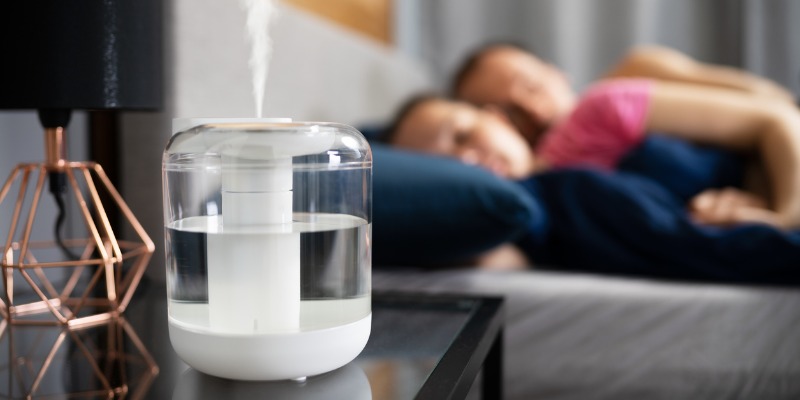When it comes to creating a comfortable and healthy sleeping environment, the benefits of a humidifier while sleeping are often overlooked. Humidifiers can play a crucial role in improving your sleep quality and overall health by adding moisture to the air. This article will explore the various benefits of using a humidifier while sleeping, the science behind how it works, and practical tips for incorporating it into your nightly routine.
Understanding Humidifiers
What Is a Humidifier?
A humidifier is a device designed to increase the moisture level in the air. There are different types of humidifiers, including cool mist, warm mist, and ultrasonic humidifiers. Each type works slightly differently but serves the same basic purpose: to add moisture to the air and maintain optimal humidity levels.
How Do Humidifiers Work?
Humidifiers work by releasing water vapor or mist into the air. Cool mist humidifiers use a fan to evaporate water, while warm mist humidifiers boil water to create steam. Ultrasonic humidifiers use ultrasonic vibrations to create a fine mist. The added moisture helps balance the humidity levels in your home, which can be particularly beneficial during the dry winter months or in arid climates.
The Science Behind Humidity and Sleep
Why Humidity Matters
Humidity levels can significantly affect your comfort and health. The optimal indoor humidity level is typically between 30% and 50%. When humidity levels fall below this range, the air can become dry, leading to various issues such as dry skin, irritated respiratory passages, and disrupted sleep.
Impact of Low Humidity on Sleep
Low humidity can cause several problems that impact sleep quality. Dry air can irritate the respiratory tract, leading to coughing, congestion, and snoring. It can also dry out your skin and exacerbate conditions like eczema or psoriasis. These discomforts can disrupt your sleep and leave you feeling restless or fatigued the next day.
Benefits of a Humidifier While Sleeping
1. Improved Sleep Quality
One of the primary benefits of using a humidifier while sleeping is improved sleep quality. Moist air can help prevent respiratory issues like dry throat and nasal congestion, making it easier to breathe comfortably throughout the night. When your airways are not irritated, you are less likely to wake up frequently and can enjoy a more restful sleep.
2. Relief from Allergies and Asthma
For individuals with allergies or asthma, a humidifier can provide significant relief. Dry air can aggravate allergy symptoms and trigger asthma attacks by irritating the airways. By adding moisture to the air, a humidifier can help reduce these irritants and ease symptoms such as coughing, sneezing, and wheezing.
3. Prevention of Dry Skin
Dry air can lead to dry, flaky skin and worsen conditions like eczema or dermatitis. By maintaining optimal humidity levels in your bedroom, a humidifier can help keep your skin hydrated and prevent it from becoming excessively dry. This can lead to smoother, healthier skin and reduce the need for frequent moisturizing.
4. Reduced Snoring
Snoring can be caused by dry, irritated tissues in the throat and nasal passages. By keeping the airways moist, a humidifier can help reduce the likelihood of snoring and improve overall sleep quality for both you and your partner. This can lead to quieter nights and a more peaceful sleeping environment.
5. Better Respiratory Health
Using a humidifier while sleeping can support better respiratory health by keeping the mucous membranes in your nose and throat hydrated. This can help your body more effectively fight off infections and reduce the severity of colds and flu. Moist air can also help reduce the spread of airborne viruses and bacteria.
6. Enhanced Comfort
Maintaining optimal humidity levels in your bedroom can enhance overall comfort. Dry air can make a room feel colder and less comfortable, while moist air can create a more pleasant and inviting environment. This can contribute to a more restful and enjoyable sleep experience.
Choosing the Right Humidifier for Your Needs
Types of Humidifiers
When selecting a humidifier, it’s essential to consider the type that best suits your needs. Each type has its advantages and drawbacks:
- Cool Mist Humidifiers: These are ideal for adding moisture to the air without raising the room temperature. They are suitable for year-round use and can be beneficial for people with allergies or asthma.
- Warm Mist Humidifiers: These devices boil water to create steam, which can help kill germs and bacteria. They are useful for providing extra warmth during cold months but may be less energy-efficient.
- Ultrasonic Humidifiers: Using ultrasonic vibrations, these humidifiers produce a fine mist and are typically quiet and energy-efficient. They are suitable for most bedroom sizes.
Size and Capacity
Humidifiers come in various sizes and capacities, so it’s essential to choose one that fits your room size and needs. A small, portable humidifier may be sufficient for a single room, while larger units may be necessary for bigger spaces or whole-house humidification.
Maintenance and Cleaning
Regular maintenance and cleaning are crucial to ensure your humidifier functions correctly and remains hygienic. Follow the manufacturer’s instructions for cleaning and replacing filters to prevent mold and bacteria growth, which can negatively impact indoor air quality.
Tips for Using a Humidifier While Sleeping
Setting the Right Humidity Level
Aim for a humidity level between 30% and 50% to avoid excessive moisture, which can lead to mold growth and other issues. Many humidifiers come with built-in hygrometers to help you monitor and adjust the humidity level.
Placing the Humidifier Correctly
Position your humidifier in a central location in your bedroom, away from walls and furniture, to ensure even distribution of moisture. Avoid placing it directly on the floor to prevent potential damage from water spills.
Monitoring for Issues
Regularly check your humidifier for signs of malfunction or buildup, such as unusual noises, leaks, or visible mold. Address any issues promptly to maintain optimal performance and hygiene.
Conclusion
The benefits of a humidifier while sleeping are substantial, ranging from improved sleep quality and respiratory health to enhanced skin comfort and reduced snoring. By understanding how a humidifier works and choosing the right type and size for your needs, you can create a more comfortable and healthy sleeping environment. Incorporating a humidifier into your nightly routine can lead to more restful, uninterrupted sleep and overall better well-being.














One thought on “Benefits of a Humidifier While Sleeping”